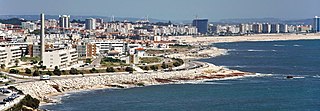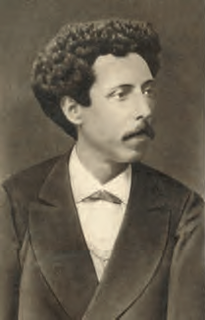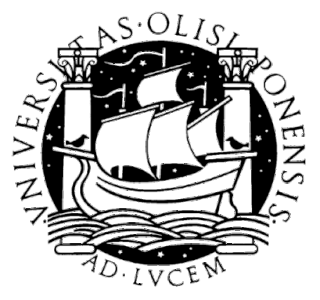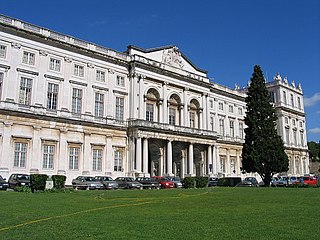
Coimbra is a city and a municipality in Portugal. The population of the municipality at the 2011 census was 143,397, in an area of 319.40 square kilometres (123.3 sq mi). The fourth-largest urban centre in Portugal, it is the largest city of the district of Coimbra and the Centro Region. About 460,000 people live in the Região de Coimbra, comprising 19 municipalities and extending into an area of 4,336 square kilometres (1,674 sq mi).

Administratively, Portugal is de jure unitary and decentralized state. Nonetheless, operationally, it is a highly centralized system with administrative divisions organized into three tiers. The State is organized under the principles of subsidiarity, local government autonomy, and democratic decentralization of the public service.

The University of Lisbon is a public research university in Lisbon, and the largest university in Portugal. It was founded in 2013, from the merger of two previous public universities located in Lisbon, the former University of Lisbon (1911–2013) and the Technical University of Lisbon (1930–2013). The history of a university in Lisbon dates back to the 13th century.

The University of Coimbra is a Portuguese public university in Coimbra, Portugal. First established in Lisbon in 1290, it went through a number of relocations until moving permanently to Coimbra in 1537. The university is among the oldest universities in continuous operation in the world, the oldest in Portugal, and played an influential role in the development of higher education in the Portuguese-speaking world. In 2013, UNESCO declared the university a World Heritage Site, noting its architecture, unique culture and traditions, and historical role.

Figueira da Foz, also known as Figueira for short, is a city and a municipality in the Coimbra District, in Portugal. Practically at the midpoint of the Iberian Peninsula's Atlantic coast, it is located at the mouth of the Mondego River, 40 km (25 mi) west of Coimbra and sheltered by hills, sharing about the same latitude with Philadelphia, Baku and Beijing. The population of the municipality in 2011 was 62,125, in an area of 379.05 km2 (146.35 sq mi). The city of Figueira da Foz proper has a population of 46,600. It is the second largest city in the district of Coimbra.

Dr José Tomás de Sousa Martins was a doctor renowned for his work for the poor in Lisbon, Portugal. After his death, a secular cult arose around his personality in which he is thanked for "miraculous" cures.
Higher education in Portugal is divided into two main subsystems: university and polytechnic education. It is provided in autonomous public and private universities, university institutes, polytechnic institutes and higher education institutions of other types.

Science and technology in Portugal is mainly conducted within a network of research and development (R&D) units belonging to public universities and state-managed autonomous research institutions. There are also non-state-run research institutions and some private R&D projects developed by companies.

The Instituto de Medicina Molecular, or IMM for short, is an associated research institution of the University of Lisbon, in Lisbon, Portugal.

The Instituto Português de Oncologia Francisco Gentil, also known as the Instituto Português de Oncologia(I.P.O.), Portuguese for Portuguese Oncology Institute, is a state-run cancer hospital and research organization in Portugal. The I.P.O. has autonomous regional branches in Lisbon, Porto and Coimbra.
The polytechnic is one of the two sub-systems of higher education of Portugal, the other being the university education. The polytechnic higher education provides a more practical training and is profession-oriented, while the university higher education has a strong theoretical basis and is highly research-oriented. Besides this, the polytechnic institutions only grant licentiate's and master's degrees, with the granting of doctor's degrees being reserved to the university institutions.

Indalencio Pascoal Froilano de Mello was a Goan microbiologist, medical scientist, professor, author and an independent MP in the Portuguese parliament.

The Campanhã Railway Station is a 19th-century railway station in the civil parish of Campanhã, in the municipality of Porto, district of Porto. Opened in 1877, it is connected to the Porto Metro, with local intercity and commuter service. The railway station provides Lisbon to north access, a through-station, and not a terminus station, serving the Lisbon-to-north allowing through running of trains from Lisbon to the north of Portugal.

The Polytechnic School of Federal University of Rio de Janeiro, also called "Poli", founded in 1792, is the third oldest engineering school in the world and oldest in the Americas, with the Military Institute of Engineering being one of the first institutions of higher education in Brazil. It is considered one of the best institutions of Latin America in engineering education. It is located in the UFRJ Center of Technology (CT), in the Cidade Universitária, Rio de Janeiro.

Venceslau de Sousa Pereira de Lima, ComTe, GCTE, ComSE, GCSE, ComC, GCC, ComNSC, GCNSC, also known as Venceslau de Lima and anglicized as Wenceslau de Sousa Pereira de Lima or Wenceslau de Lima, was a Portuguese geologist, paleontologist, viticulturist, and politician who, among other functions, served as a member of Parliament, a minister, and as President of the Council of Ministers. He was a member of the Sciences Academy of Lisbon.

The University of Lisbon was a public university in Lisbon, Portugal. It was founded in 1911 after the fall of the Portuguese monarchy and was later integrated in the new University of Lisbon along with the former Technical University of Lisbon. The history of a university in Lisbon dates back to the 13th century.

The Faculty of Pharmacy, Universidade de Lisboa (FFUL) is a Portuguese public institution of higher education dedicated to education, research, knowledge transfer and continuing education in the fields of pharmacy, medicine, and pharmaceutical sciences.

The Direção-Geral do Património Cultural (DGPC), formerly the Instituto de Gestão do Património Arquitectónico e Arqueológico (IGESPAR) and Instituto Português do Património Arquitetónico (IPPAR, is a general directorate of the Government of Portugal tasked with the conservation, preservation, and inventory of Portuguese architectural heritage. This includes buildings and sites of historical, architectural, scientific or artistic value. The institute keeps a registry of all the classified sites and issues legally binding opinions regarding any works on them.















